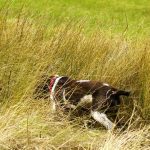Caring For Older Dogs.
As our beloved dogs get older, they can go through many different changes physically, as well as mentally. This Holidays4Dogs article will find out more about at some of the changes that can occur as our dogs enter their golden years. Read on for some insights into caring for older dogs.
Muscular and Skeletal Changes in older dogs.
Just like people, the aging dog goes through many physical changes and some of them can be quite acute. Senior dogs lose muscle mass and as a result, mobility is likely to be affected. Because dogs are social creatures, this lack of mobility may affect his behaviour. For instance, the elderly dog might become anxious if he can no longer follow his owner around, or jump onto the furniture.
A solution may be to provide the dog with a comfy bed placed in the centre of household activity. A dog who may be in discomfort because of a loss of body mass, will find lying on a hard floor uncomfortable. A central resting place, will mean he is comfortable and less likely to feel the need to keep getting up and following his family around.
Sometimes older dogs grow grumpier and this can also be a result of physical changes. Therefore, it is important to be a little more vigilant when caring for older dogs.
When a dog can no longer get away easily from a noisy child, or an irritating younger dog, for example. He, or she, may resort to growling, or snapping, in order to make the unwelcome dog, or person, go away. It is important that older dogs are supervised carefully with other dogs and children.
Sight and Hearing Changes.
Cataracts are a common visible change that owners will recognise in their dogs. Sometimes this can contribute to possible aggression if the dog becomes startled unexpectedly. If your dog can still hear ok, speak to him before you touch him – particularly if he has his back to you, or is asleep.
Deafness can also impact on a dog’s change in behaviour. A once obedient dog, may appear ‘stubborn’. However, with patience, it is possible to substitute hand signals for verbal commands. Many older dogs get the hang of this as long as their sight isn’t affected.
Some older dogs with hearing loss may begin to bark more frequently than they used to. It is important to understand that hearing loss can change a dog’s perspective of the world immensely. This is even more marked if he has also lost some of his sight as well.
Incontinence in the ageing dog.
This can be one of the most frustrating things for owners to deal with when caring for older dogs. Unfortunately, kidney function does deteriorate with age and urinary incontinence is a common issue in the aging dog.
Allowing your dog more frequent access to the outdoors often helps, but you should never limit your dog’s access to water – not even at night. As with a deaf dog, it might be a solution to keep an incontinent dog near to you during the night so you can be more aware if he asks to go out. Otherwise, you could resort to training him to use newspaper, or puppy pads, for night time use.
 Cognitive Dysfunction.
Cognitive Dysfunction.
Many older dogs can become confused, or disorientated, as they age and this can be quite upsetting for people caring for older dogs. For a dog that seems confused by his environment, it is essential to supervise him and provide a safe, enclosed space, for him when you cannot be around.
Some elderly pets will be a lot less attentive than they were in their younger years and may no longer seem to comprehend previously understood commands. It is really crucial to remain patient with a dog that shows signs of confusion.
Changes in Routine.
Senior dogs can often begin to dislike a change in routine and may become stressed, or anxious, with new people or new environments. Even in a previously confident dog, he may become less equipped to deal with the stresses of a busy holiday, or a long car journey, for example.
It is worth noting that Holidays4Dogs have some wonderful highly experienced carers who are happy to look after elderly dogs.
Final thoughts on the ageing dog.
Many changes take place in our pet dogs as they reach old age, so there may need to be some adjustments when caring for older dogs. However, with plenty of love and patience, as well as prompt veterinary care, our four-legged friends can live long and comfortable lives, while still providing us with their wonderful companionship.
If you have recently lost an elderly dog, you may like to have a look at our other Holidays4Dogs article on coping with pet loss.



